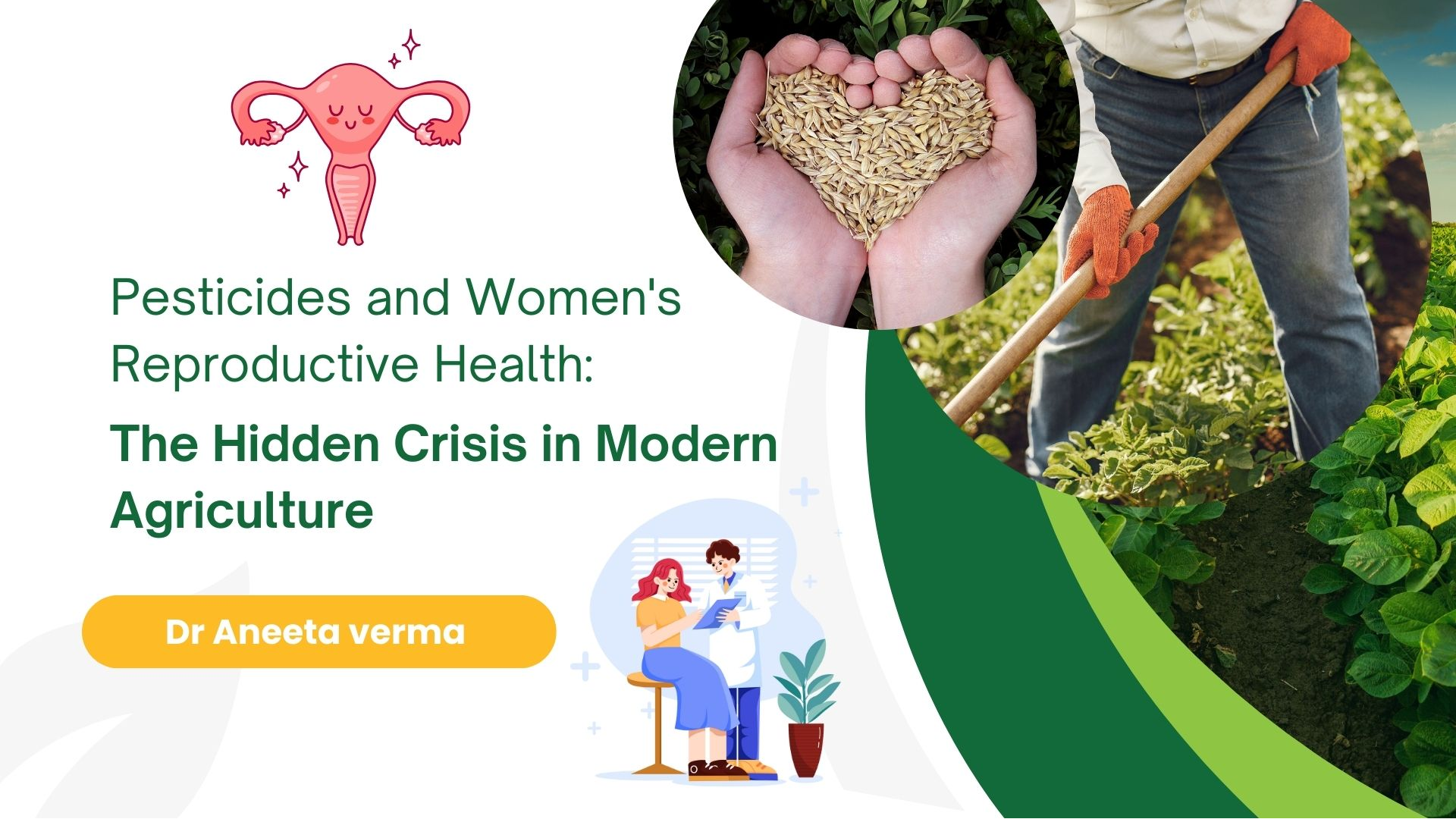+918048051883

This is your website preview.
Currently it only shows your basic business info. Start adding relevant business details such as description, images and products or services to gain your customers attention by using Boost 360 android app / iOS App / web portal.
Best wellness Consultant in Gurgaon : Eyes open...

Best wellness Consultant in Gurgaon : Eyes opening fact on women reproductive health must read Pesticides and Women's Reproductive Health: The Hidden Crisis in Modern Agriculture The use of pesticides in the food industry has become an unavoidable reality. While these chemicals were initially introduced to protect crops and increase yields, they have resulted in severe consequences for human health—particularly for women. Research has uncovered alarming links between pesticide exposure and infertility, hormonal imbalances, pregnancy complications, and even cancers related to the female reproductive system. Despite the growing body of evidence, the food industry continues to downplay the risks, while governments struggle to regulate these toxic substances effectively. This article aims to expose the devastating impact of pesticides on women's reproductive health, backed by real-life case studies, and offers solutions for a safer future. 1. The Pesticide Problem: How the Modern Food Industry Harms Women a) The Rise of Chemical-Intensive Farming Since the mid-20th century, industrial agriculture has relied on synthetic pesticides such as: Organophosphates (Chlorpyrifos, Malathion)– Neurotoxic chemicals that disrupt hormonal and reproductive functions. Organochlorines (DDT, Lindane) – Linked to infertility, miscarriages, and breast cancer, despite being banned in some countries. Glyphosate (Roundup) – A widely used herbicide classified as a "probable carcinogen" by the WHO. Neonicotinoids – Pesticides that interfere with estrogen and other hormonal pathways. These chemicals do not just stay on crops; they accumulate in the soil, water, and even in human tissues, affecting health over time. b) Why Women Are More Vulnerable Pesticides act as endocrine disruptors, interfering with the delicate hormonal balance essential for reproductive health. Unlike men, women undergo complex hormonal changes throughout life—puberty, menstrual cycles, pregnancy, and menopause—which makes them particularly susceptible to these toxins. Research shows that even low-dose exposure over time can lead to severe consequences. The most concerning effects include: - Disrupted Menstrual Cycles – Pesticide exposure has been linked to irregular periods, heavy bleeding, and early menopause. - Infertility and Delayed Conception – Women with high pesticide residues in their bodies take longer to conceive. - Miscarriages and Stillbirths – Pesticide exposure during pregnancy significantly increases the risk of fetal loss. - Congenital Defects in Newborns – Babies born to mothers exposed to pesticides are more likely to have birth defects, neurological disorders, and developmental delays. - Increased Risk of Female Cancers– Breast, ovarian, and uterine cancers have been linked to long-term pesticide exposure. -2. Case Studies: The Real-Life Impact of Pesticides on Women Case Study 1: Pesticide Exposure and Infertility in Rural India In Punjab, India—known as the "breadbasket of India"—the use of pesticides has skyrocketed, leading to rising cases of infertility among women. A 2018 study found that 60% of women in highly pesticide-exposed areas had difficulty conceiving . Many suffered from repeated miscarriages, likely due to contamination of groundwater with organophosphate pesticides. Despite numerous reports, little has been done to regulate these chemicals. Case Study 2: The Tragic Consequences of DDT in the U.S. In the mid-20th century, DDT (an organochlorine pesticide) was widely used in the United States before being banned in 1972. However, its effects are still seen today. A long-term study found that women whose mothers were exposed to DDT during pregnancy had a higher risk of breast cancer and reproductive disorders. This proves that pesticide exposure can have intergenerational effects. Case Study 3: Argentine Women and Glyphosate Exposure Argentina, one of the largest soybean producers, heavily uses glyphosate-based herbicides. A 2021 study found that women living near agricultural fields had higher rates of miscarriages, premature births, and birth defects compared to those in urban areas. Glyphosate was found in their urine samples, proving direct exposure through food and water. Case Study 4: Female Farmers in California’s Central Valley A study conducted in California’s Central Valley, where large-scale farming relies on heavy pesticide use, found that women working in the fields were more likely to develop PCOS, suffer from pregnancy complications, and give birth to children with autism. The pesticide chlorpyrifos, banned in some states but still used in many parts of the world, was identified as a major culprit. 3. The Food Industry’s Cover-Up: Profits Over Women's Health Despite mounting evidence, the food industry continues to: - Suppress Independent Research – Studies linking pesticides to reproductive harm are often challenged by industry-funded research that downplays risks. - Use Misleading Labels – Many pesticide-laden products are marketed as "safe, " hiding the true toxicity. - Lobby Against Regulation – Chemical companies spend millions to block pesticide bans and weaken safety laws. - Silence Whistleblowers – Scientists and activists raising concerns often face legal threats and professional repercussions. 4. How Women Can Protect Themselves and Their Families** a) Reduce Pesticide Exposure Through Food Choices - Buy Organic When Possible – Organic foods have significantly lower pesticide residues. - Wash and Soak Produce – Rinse fruits and vegetables with baking soda or vinegar water to remove surface pesticides. - Eat Seasonal and Local– Locally grown produce is less likely to be treated with harmful long-distance preservatives. b) Detoxify the Body Increase Antioxidant Intake – Foods rich in vitamin C, turmeric, and green tea help detoxify pesticides from the body. Drink Filtered Water– Many pesticides leach into groundwater, so a good filter is essential. Support Liver Health – The liver processes toxins, so eating cruciferous vegetables (broccoli, cauliflower) can enhance detoxification. c) Advocate for Change - Demand Transparency in Food Labeling – Push for better pesticide disclosure on food products. - Support Bans on Harmful Pesticides – Get involved in local activism to protect public health. - Educate Others – Raising awareness about pesticide risks can pressure the food industry to adopt safer practices.

